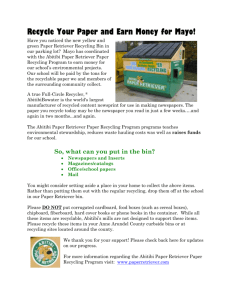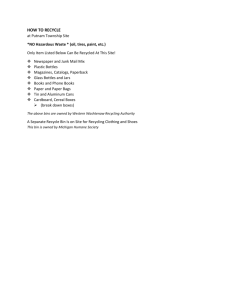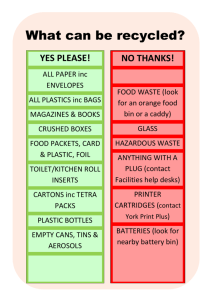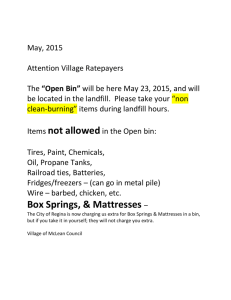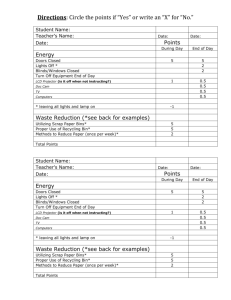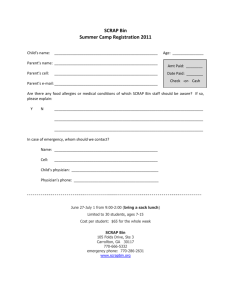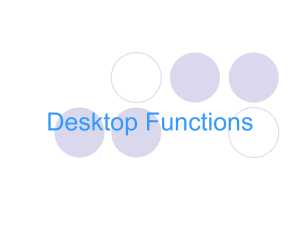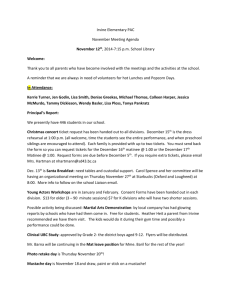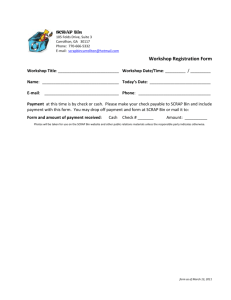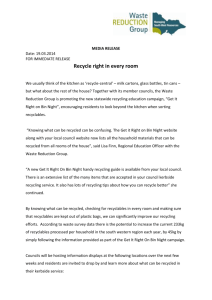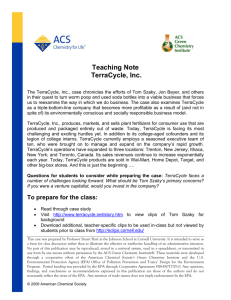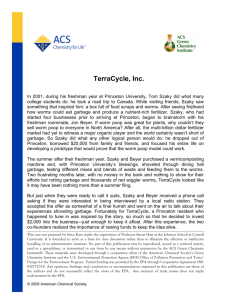The word oyster is used as a common name for a number of distinct
advertisement
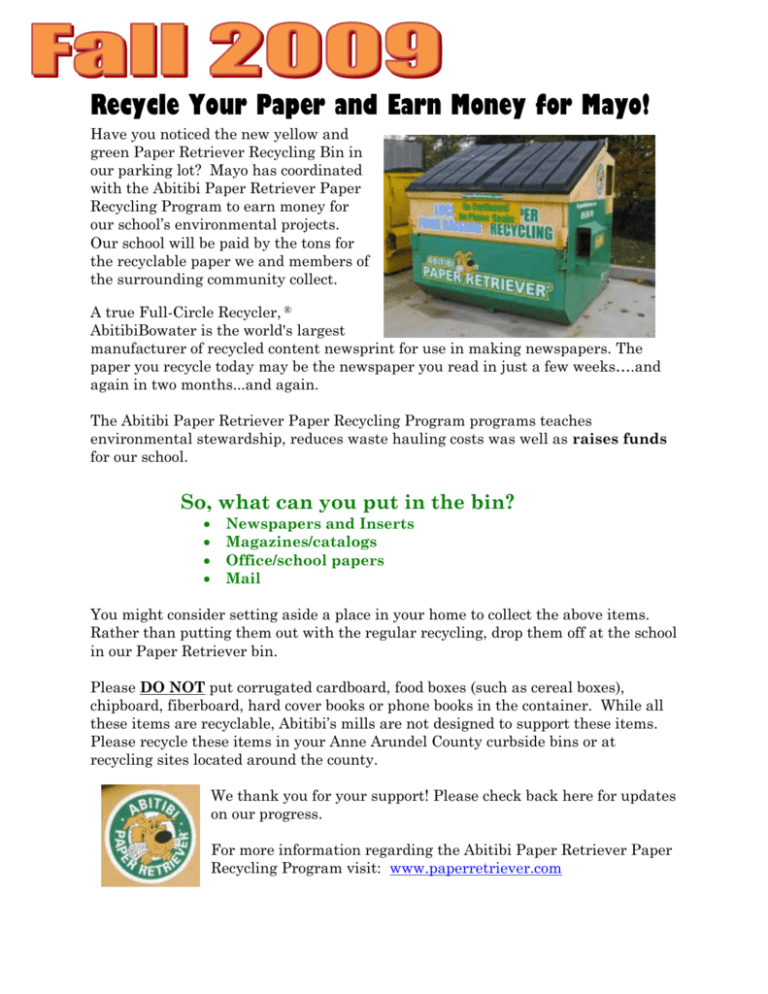
Recycle Your Paper and Earn Money for Mayo!
Have you noticed the new yellow and
green Paper Retriever Recycling Bin in
our parking lot? Mayo has coordinated
with the Abitibi Paper Retriever Paper
Recycling Program to earn money for
our school’s environmental projects.
Our school will be paid by the tons for
the recyclable paper we and members of
the surrounding community collect.
A true Full-Circle Recycler, ®
AbitibiBowater is the world's largest
manufacturer of recycled content newsprint for use in making newspapers. The
paper you recycle today may be the newspaper you read in just a few weeks….and
again in two months...and again.
The Abitibi Paper Retriever Paper Recycling Program programs teaches
environmental stewardship, reduces waste hauling costs was well as raises funds
for our school.
So, what can you put in the bin?
Newspapers and Inserts
Magazines/catalogs
Office/school papers
Mail
You might consider setting aside a place in your home to collect the above items.
Rather than putting them out with the regular recycling, drop them off at the school
in our Paper Retriever bin.
Please DO NOT put corrugated cardboard, food boxes (such as cereal boxes),
chipboard, fiberboard, hard cover books or phone books in the container. While all
these items are recyclable, Abitibi’s mills are not designed to support these items.
Please recycle these items in your Anne Arundel County curbside bins or at
recycling sites located around the county.
We thank you for your support! Please check back here for updates
on our progress.
For more information regarding the Abitibi Paper Retriever Paper
Recycling Program visit: www.paperretriever.com
Composting
By Sarah
Do you ever have too many food scraps, like fruits and
vegetables? Or do you drink a lot of coffee? You don’t
want all those things to be thrown in the landfills do
you? Instead of having all those scraps thrown in the
landfills you can have a compost bin. It’s pretty easy to
make a compost bin. All you need is a plastic net with holes, some posts, and all
those food scraps. Once you have the compost bin done you just start putting all
the food scraps that I mentioned in your bin along with leafs and other lawn scraps.
Fruits, vegetables, and coffee grounds are ok, but you don’t want
to put meats, dairies, or breads in there, because that will attract
animals. Once you have lots of scraps in your bin, you should
mix it around about every 2 days. After a while, you should
have rich soil to use in your gardens.
Saving Energy
By: Cole
Conserving energy is when you save energy.
You can save energy by turning off the lights
when you are not in the room. It saves a lot
of energy (and money) if you change all the
light bulbs in your house to CFLs. Also you should turn off your heat or air
conditioner when you’re not home to save energy. You can adjust the
temperature just a little bit on your air conditioner or heater and that can
save LOTS of energy and money. When you are not playing Xbox, you
should unplug it or turn it off. Also you should turn off the computer and
its monitor when you are not using it because
when it is on standby it still uses energy! When
you aren’t using your printer turn it off!
SAVING ENERGY SAVES
MONEY!!
Water Conservation
By: Jara
Water Conservation is when you are trying to
save water. You can save water one way by
turning the water off when you are not using the
water for brushing your teeth. Or when you are
washing your dishes you can get a large plastic
container to wash your dishes instead of letting
the water run into the sink while you are
washing them, then you could throw all that
water out over your plants and gardens. Did you know that
with an older shower head you could use up to
80
gallons
of water in a 10 minute shower and with a newer shower
head you use
30 gallons in a 10 minute
shower? Can you even believe this? There is a
50
gallon difference! Also, when you are
taking a shower you can turn off the water
when you are scrubbing shampoo into your hair
and then you could turn the water on to rinse.
Saving water helps save our environment!
Christmas trees that are good for the earth
By Daniel
A fake Christmas tree is made
out of plastic and it is not
made with the best chemicals
to put in a house, plus when
you are done with it will not be
good for the environment.
Also, no matter how real it
looks it still does not have the
real feel or smell of a real, fresh Christmas tree. If you go
to buy a real one, you should go to a Christmas Tree Farm
because those trees were grown to be put in our houses
and they would put new seeds where
the ones that have been cut down. But
randomly cutting a tree in the forest is
bad because there is no tree to replace
and it was not meant to be cut down.
Give a gift of experience
By Sam
What do you give to those
who have everything? Do
you get them a bike, ring,
laptop or an iPod that
they don’t really need? no
you should get them an
experience. For example,
a trip to the zoo, a night out to dinner, a
trip to the movies, a massage, a pedicure, or
concert tickets - all of these are earth
friendly. Many gifts get
pushed in the back of the
closet so you should not
get them that. The
experiences will last
forever in their memory.
Green Christmas Wrap
By Madelyn
If you don’t want to buy
any more wrapping
paper that you have to
throw away every year, you could use
fabric and cut it with pinking shears (a
serrated cut will not ravel) and you can
use the fabric over and over again year by
year. If you wrap a gift to a friend in
fabric, they can use it over and over again
without wasting wrapping paper, plus it
makes the gift extra special. And you can
pack it away with your Christmas
decorations to use again
next year.
What’s In Your Lunch?
By Myranda
Did you know Mayo students throw away an average of 100 pounds
of trash every day? Instead of throwing away your trash, find
ways to re-use, recycle, or compost your leftovers. Some
children like the individually wrapped chips, cookies, etc. Buy
larger bags of the snack items so there is less to throw away.
You can use Tupperware, Ziploc, and Rubbermaid containers
instead of plastic bags. Use lunch boxes instead of a paper
bags. Use refillable bottles instead of the use once throw away
bottle. Try to have the least amount of waste in your lunch.
Everyday something that can be recycled is thrown away. If you
add up all the days in the year and how much is thrown each day
that is a lot of trash in America’s landfills.
Erosion Control
By Sarah
Have you seen the hills that are falling apart? That’s called
erosion. Erosion is when wind and water move soil from
one place to another. Erosion is bad for the Chesapeake
Bay because it washes the soil into the Bay. That soil
might have trash, yard waste and poisonous chemicals, such as fertilizers, that
could kill animals and plants in the Bay.
You can prevent this by planting trees or a
garden. Cock spur hawthorn trees are good
for preventing erosion on sunny side slopes.
Also you can include bottlebrush grasses on
slopes. Planting helps control erosion by
holding the soil together.
Help save Oysters
By Jara
The word oyster is used as a common name for a
number of distinct groups of bivalve mollusks which
live in marine or brackish habitats. The valves are
highly calcified.
As I had found out 60% of oysters live and 40% of
oysters die in general.
If you wanted to start your own baby oyster farm
you could go to Discovery Village in Shadyside at
4800 Atwell Rd. Shadyside MD 20764. If wanted to
start to raise oysters you would have to either use well
water or fresh water to clean the cage once a week
Some oyster websites are
www.cbf.org {Chesapeake
Bay Foundation},
www.discoveryvillage.net.
Did you know that oysters
can suck in the dirty water then blow out clean water
for the bay? Also if an oyster is healthy it can filter up
to 50 milk gallon of water a day!!
Yesterday’s Trash becomes
tomorrow’s Treasure
By Ms. Martin
Every year BILLIONS of drink pouches end up in dumpsters and landfills across
America. TerraCycle is working together with Capri Sun and Honest Kids to put an
end to this loss of resources. To help them on their mission, Mayo Elementary has
been participating in the Drink Pouch Brigade with TerraCycle since January.
Every day, at lunch, students place their empty drink pouches into the specially
marked bin in the cafeteria. After the last lunch period,
Environmental Club students sort and box up the empty
pouches (TerraCycle only accepts the Capri Sun and
Honest Kids brand pouches). When the boxes are filled
they are shipped to TerraCycle, where they upcycle the
pouches into new products likes totes, lunchboxes,
backpacks, pencil pouches and more! The company gives
us 2¢ for every pouch we send in; so far we have sent in
2,666 pouches and earned $53.32! Keep those pouches
coming!!
Visit www.terracycle.net for more information about their
collection brigades and where to order their products.
